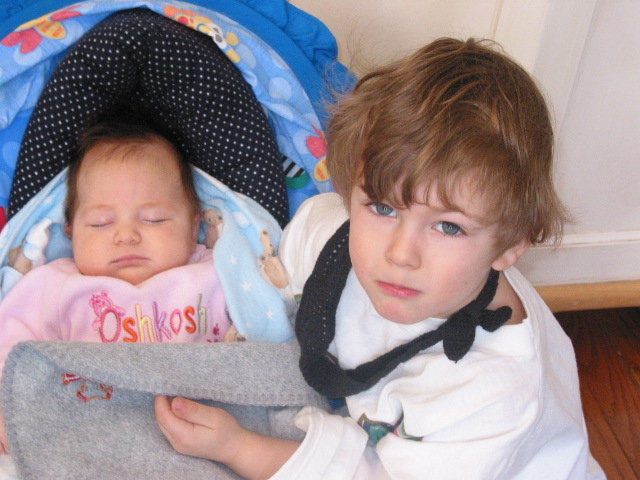
I'm good at several things, but I am not a parenting expert. However, one thing I do have is the luxury of running a parenting website filled with great advice and insight — from parents of all stripes. Recently I was asked for advice from someone who is parenting a 14 year-old daughter. The question was about managing the transition to becoming a teenager — one who wants to spend tons of time with her friends. They wondered how much a parent should step in to manage a teen's time and priorities. I do have a teenager, and this is something I have dealt with, so I felt I could at least offer my opinion (since I was asked).
My short answer: Like snowflakes, every kid is different and needs to be parented in a way that makes sense for who they are.
My long answer? This one took some thought, but it starts and ends with the best advice I've ever been given about being a parent:
"The art of parenting your kids is to teaching them to make the right choices when you're not around."
BOOM.
WHEN YOU ARE NOT AROUND.
For as much as we all want to live forever, that's not going to happen.
The advice rings true. Our job as parents is to help our kids grow to realize the profound importance of understanding right from wrong, and to empower them to make choices based on this information. This is the art of raising amazing kids.
How you get there can vary, but having two pretty amazing kids (if I do say so myself!) makes me feel like my advice might have at least some value - and I am all for moms helping moms. Parenting means living on the learning curve, but here are some "rules" I've used successfully with my kids in helping them make smart choices when I'm not around:
(Note: my definition of "amazing kids" means they are happy, moral, kind, empathetic, and empowered).
This goes back to the idea of starting your relationship with your baby or toddler with the understanding that the expectations you set will form the basis of your teenager's behaviour. It's really hard to change rules mid-stream, so think about setting ground rules early in the game. For example, from the time my kids were tiny we had one rule: DO NOT EAT ON THE WHITE COUCH. They can play on it, jump on it, sleep on it, but food is forbidden. Fast forward eight years later and our sofa still looks great. And my kids have pride of ownership knowing they are partly responsible for not having ruined it. (You should see my kids react with superhero speed if one of their friends accidently gets near it with food in hand!)
Another rule we made early on concerns cell phones. We actually outlined our expectations in a contract my son signed when he was given his first phone. Some of the line items he had to agree to were: no phones at the kitchen table, no phones in the bedroom overnight, and always respond to our texts. It's best to begin something as you mean to finish, so if you don't put those rules in place at the outset, it's definitely more difficult to put them into play without your kids' feeling their rights are being throttled. So try and think ahead and set rules in place before you actually need them.
No matter how awesome kids are, they are going to break rules— it's part of growing up. They need to know in advance what the consequences are for their actions, and then parents need to follow through on enacting the consequence. If my kids break the agreement laid out in their phone contract, their phone is taken away for short periods of time. It stings and reminds them we mean business.
Make sure the consequences you attach to the rule are actually feasible. For example, my husband yelling, "That's it! If you don't go to bed now you're not hanging out with your friends for the next month," would get a thumbs down. First, the consequence has nothing to do with the misbehaviour. And, more importantly, we'd never "punish" our daughter like that because it makes no sense. The questions we ask ourselves is "in what way would this consequence help this kid make the right choice when we're not around?" If my kids go to sleep way past their bedtime, I point out why they're so tired the next morning. The last time my daughter stayed up late she immediately came down with a cold. Not that I want my kids to feel sick, but she is now able to connect poor sleep with not feeling well.
I give my kids a fair amount of age-appropriate freedom. However, I always define what the boundaries are. Clear expectations let my kids know how far they can go (physically or metaphorically). I believe giving kids boundaries shows them you care about their well-being. It also gives them the ability to make the right choices and for you to acknowledge their awesome behaviour.
When something is earned, it holds more value. My kids have housework chores assigned to them. Even though they occasionally grumble, when they've done the work they puff up their chests with pride. Accomplishment feels good and builds self esteem. When they receive their weekly allowance, they know they've earned it. Plus, now I don't have to empty the dishwasher!
This also applies to the time my kids spend with their friends. Homework needs to be considered before they can hang out with their buddies. Somewhere in the equation, my kids have to commit to when their work will get done. If it's not done, they can't hang out with their friends the next time. There have been a few times when they've reneged on their deal and we followed through with limiting their social time. They realized we were serious about work being a priority. Now, if they promise to do something, they follow through.
Trust is an earned privilege. My kids get that. They know I worry if they're late. When they promise to be home at a certain time, they do their best to arrive on time. Or they call or text with an explanation. Slowly, they are earning their independence by proving themselves.
You don't have to agree with them. You're allowed to be upset with them. But do not — ever — embarrass your kids in public. If you feel like strangling them because they did something they shouldn't have, calmly and quietly invite them somewhere private to tell them why you're upset. Let them save face around people they know. Humiliating them publicly just erodes trust between the two of you. I hope they remember this aspect of my parenting when I turn into Sophia from The Golden Girls.
I believe in the old adage that you can tell a lot about someone by the friends they choose. When your kids are little, you control their social life. But as they get older, you get kicked out of their social circles. So I work hard at getting my kids to invite all their friends over to our place to hang out. I tempt them with great after school snacks so I can get know their friends. Getting a sense of who their friends are makes me more (or less) comfortable when my kids want to hang out with their friends. I also make an effort to connect with the parents whenever possible, because you just never know when that connection will be helpful.
Seriously. Never yell ESPECIALLY when you're angry. Plus, it's way scarier when you whisper.
And now to answer my friend's question about their daughter based on all of the points above:
If you have raised your daughter to follow your ground rules, this shouldn't be too challenging. When homework, chores, or other responsibilities and expectations are taken care of, she's earned the right to her independent time. Boundaries are important, so set reasonable curfews. If she misses a curfew, she deals with the predetermined natural consequences. Make sure you know who she's out with (file this under boundaries). If she messes up, tell her privately rather than embarrass her when she's still with friends. Don't yell. Talk it out. Rinse and repeat. And there you have it. An amazing daughter who hopefully will make smart choices when you're not around.
